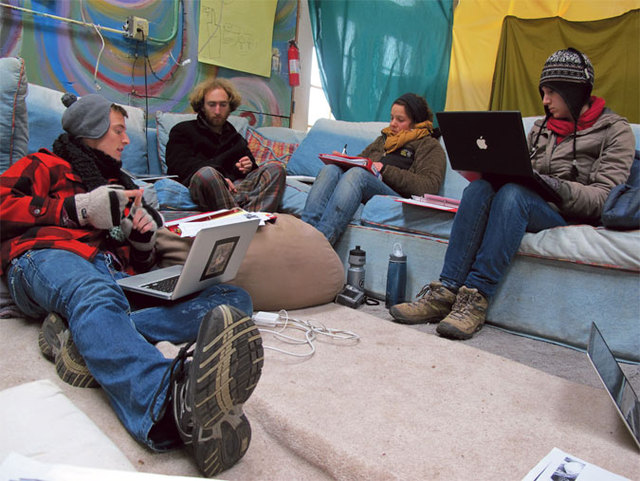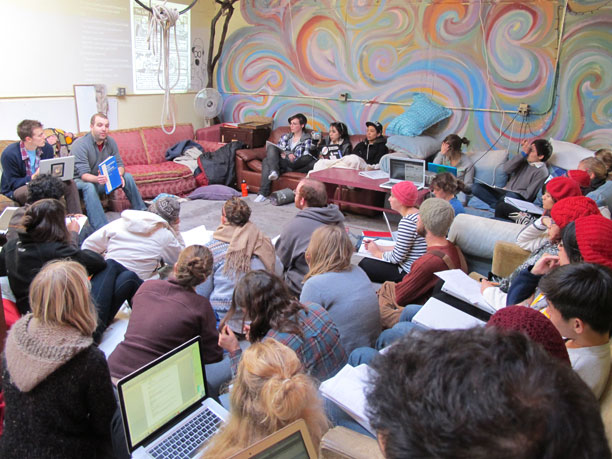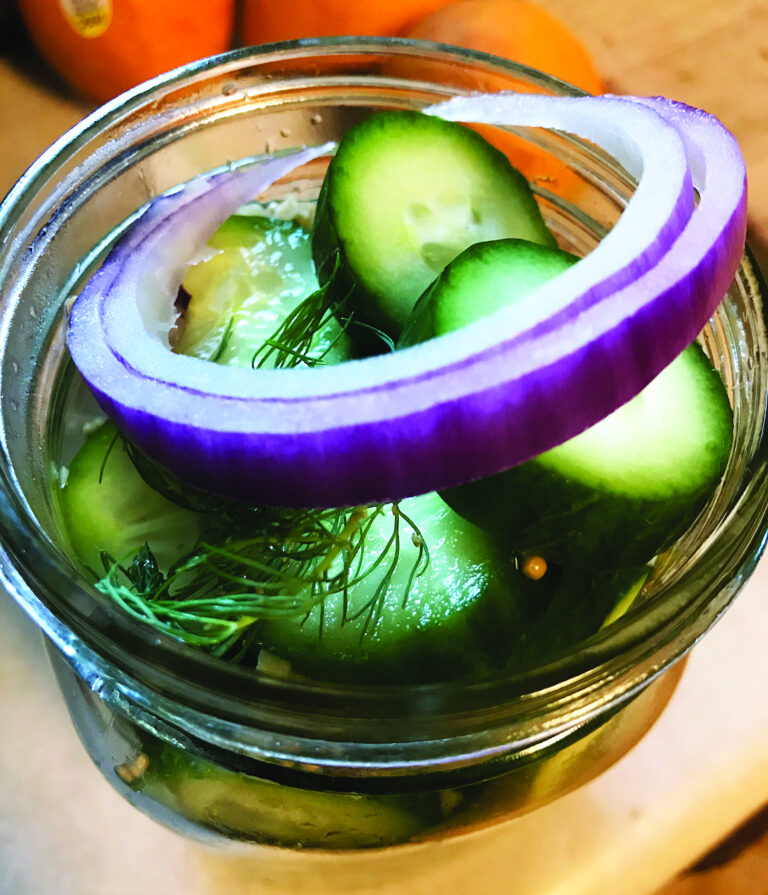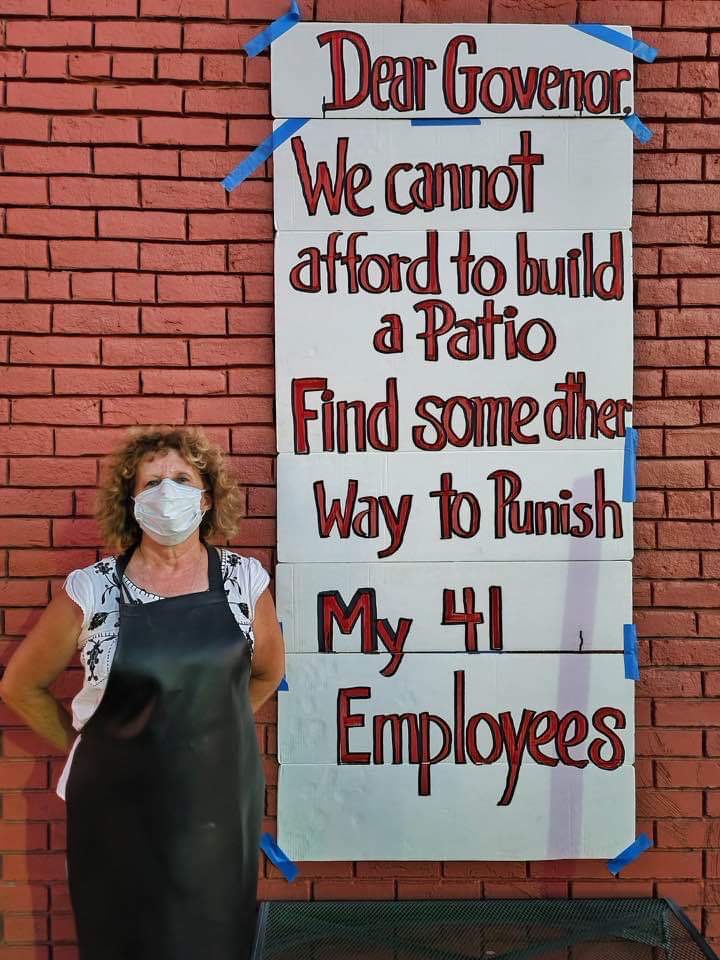The youth of the world are at the cutting edge of revolution. But their passion, energy and uncluttered perspectives are often undermined by short attention spans, disorganization and lack of real-world experiences.When I was in college, a group of people called "scroungers" hung out by the cafeteria’s dishwashing station, intercepting students as they dropped off their trays, politely asking, "Are you done with that lasagna?" "Mind if I finish off that brownie?"Some scrounged out of financial necessity, others for adventure and perverse glory. But most did it to help curtail the waste encouraged by the all-you-can-eat setup of the cafeteria. Ironically, the scroungers provided a buffer against the possibility of students feeling guilty for wasting food, because you could justify an overloaded tray knowing the scroungers would take care of it. So it isn’t clear any waste was prevented.And then there were the proto-foodies I called the Hippie Noodle People. Cognizant not only of the waste in the cafeteria, but also the fact that the cafeteria food sucked, they sold homemade food (noodles in peanut sauce with chopped scallions, for example) in the student union. In today’s regulatory climate, the Hippie Noodle People, not to mention the scroungers, would probably be chased out. But their spirits live on in a much more sophisticated and better organized, if no less idealistic, wave of college foodies.As we’re seeing in the Middle East, it can be easier to point out what’s wrong with a picture than to come up with a solution. But that doesn’t make a problem any less pressing. An organization called CoFed started, as many organizations do, with a movement. And like many movements, that started with a protest—in this case, against the opening of a Panda Express fast-food restaurant in 2009 in the U.C. Berkeley student union.Adding symbolic oomph to the protest was the fact that the student union is named after César Chávez, the famous labor organizer and founder of the United Farm Worker’s union. The would-be intruder, another of Panda Express’ 1,300-plus outlets, was turned away. And the students kept their momentum going by raising more than $100,000 to create the Berkeley Student Food Collective in late 2010. Styled like a convenience store where students can grab a quick premade meal or snack, BSFC is now up and running, providing clean, healthy, fair-trade, affordable food—with all of the produce grown within 150 miles of campus.It’s not surprising that this idea was born at Berkeley. Besides being a petri dish for left-leaning foodies, the university happens to be in a state blessed with a yearlong growing season, where it’s possible for locavores to practice their preferred diet full time. Believing they had an important model to share, BSFC organizers decided to package it for export to other colleges and universities. Thus the national Cooperative Food Empowerment Directive—CoFed for short—was born."This is a natural response of the ecosystem," says Yoni Landau, a 23-year-old Berkeley graduate who was part of the anti-Panda Express and ensuing Berkeley Student Food Collective movements, and was a founding member of CoFed. Landau considers himself and his fellow foodies part of an urban, academic ecosystem capable of making adjustments to keep itself in balance. "The best thing about unsustainability is that it’s unsustainable," he says.The scroungers and the Hippie Noodle People where I went to college could be framed as a natural response of the ecosystem as well. But the Hippie Noodle People soon disbanded for other pursuits. And while the scroungers kept scrounging, they didn’t really accomplish anything other than saving up some extra beer money.Efforts such as the ones at my college suffer not only from disorganization and distraction, but also from student turnover that draws away even the most dedicated and capable. But CoFed sees turnover as an opportunity to engage a constantly renewing stream of fresh blood. And to insure against the threats to sustainability posed by inevitable attrition, CoFed plans to eventually offer regional trainings for management teams that are crafted to protect both organization and procedure from the ever-shifting winds of individual personalities.At a training session in Sebastopol, Calif., 30 students from 10 colleges gathered to teach and learn how to create student food collectives on their home campuses. The training was based on a newly minted CoFed-produced manual. It’s a sophisticated document tailored to the creation of student food collectives specifically, but it would also be useful to businesses and nonprofits in any field. It touches on such topics as team building, record keeping, conducting market research, handling media, fundraising, obtaining necessary permits and negotiating a lease. As Landau explains, the CoFed game plan breaks the task of opening new collectives into four focus areas: people, plan, space and money. These add up to a business strategy with a "triple bottom line" of people, planet and profit designed to empower cooperatives to hold their own against the fast-food restaurants circling for student food dollars. CoFed’s five-year plan aims for the creation of 35 student cooperatives across the country; a handful are already in place on various college campuses.In fact, the CoFed effect has made it to UNM, where students began clamoring for their own co-op last year. They ended up joining forces with UNM’s Sustainability Studies Program and partnering with the La Montañita Co-op. The result: On Jan. 18, an 800-square-foot La Montañita satellite store opened in the UNM Bookstore building.While not every school is in a climate that can support the locavore candy store of California schools, CoFed’s principles are flexible enough to find a balance between principle and reality. "The seasonal local food in winter does get a little less varied in places like the Midwest," Landau explains. He says that in order to maintain enough diversity to avoid turning off customers, food would have to be shipped further to some collectives in winter. "But it would still be fair trade and sustainably produced."The possibilities for what can happen in these student collectives are wide open. Student-led workshops on food preservation and cooking—not to mention meetings against the next Panda Express—could be held in the same space where they buy affordable organic salads and fair-trade coffee for lunch.If they were around in my day, student food collectives like these would have distracted the scroungers, absorbed the Hippie Noodle People and perhaps put my college snack bar out of business.













